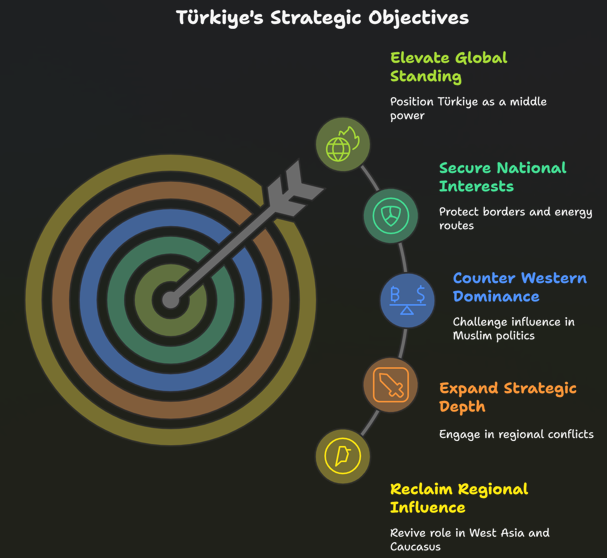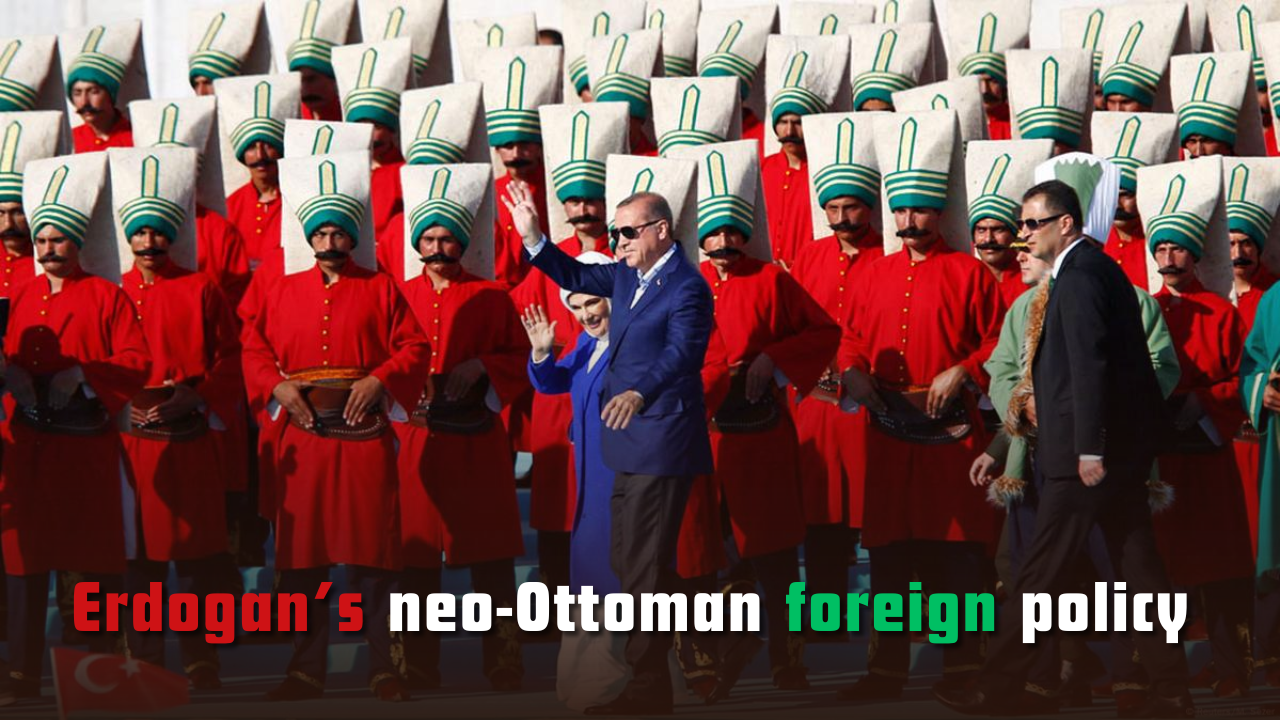Font size:
Print
Erdogan’s neo-Ottoman foreign policy
Erdogan’s Neo-Ottoman Foreign Policy: Ambitious Resurgence with Fragile Foundations
Context: Türkiye’s foreign policy under President Recep Tayyip Erdoğan has undergone a significant transformation, shifting from the traditionally secular and Western-oriented Kemalist diplomacy to a more assertive, Islamist-leaning strategy.
What are the Key Features of Türkiye’s Neo-Ottoman Foreign Policy
- Islamist Orientation: Stronger ties with Muslim-majority countries and backing for Islamist movements like the Muslim Brotherhood.
Evolution of Neo-Ottoman Foreign Policy
- Kemalist Era (1923–2002): Under Mustafa Kemal Atatürk, Türkiye adopted a secular, non-interventionist foreign policy with the motto “Peace at home, peace in the world.” It aligned closely with the West, joining NATO post-World War II.
- Early AKP Years (2002–2010): Erdoğan’s AK Party, elected in 2002, initially followed a pro-Western economic stabilisation path and even pursued EU membership.
- Arab Spring and Beyond (2011–Present): The Arab uprisings marked a turning point. Erdoğan openly supported protest movements and Islamist parties, viewing them as tools for reshaping the regional order in Türkiye’s favour — a modern attempt to redraw the lines imposed by colonial-era agreements like Sykes-Picot.
- Regional Assertiveness: Military presence and interventions in West Asia, North Africa, and the Caucasus.Drone Diplomacy and Defense Exports: Use of Turkish drones (e.g., Bayraktar TB2) in conflicts like Syria, Libya, Azerbaijan, and Ukraine.
- Selective Alignment: Balancing relations with NATO and the West while engaging with Russia, Iran, and Qatar.
- Strategic Military Footprint: Establishment of military bases (e.g., in Qatar) and defense cooperation with allies and partners.
- Soft Power via Religious and Historical Ties: Promotion of a pan-Islamic identity inspired by Ottoman heritage.
How has Erdogan Balanced Islamism with Pragmatism?
While Erdoğan champions Islamic solidarity, his realpolitik has ensured Türkiye’s geopolitical relevance and preserved critical alliances:
- Syria:Türkiye initially supported the Free Syrian Army and later Hayat Tahrir al-Sham (HTS), an al-Qaeda offshoot, to oppose Bashar al-Assad.
-
- Despite backing Islamist rebels, Ankara entered into agreements with Russia to control border regions, avoiding direct confrontation.
- In November 2024, Türkiye’s backing of HTS helped capture Damascus, expanding Turkish influence, albeit controversially.

- Azerbaijan: In the 2023 war against Armenia, Türkiye supported Azerbaijan with drones and strategic backing.Despite Armenia’s alliance with Russia and Türkiye’s NATO ties, Erdoğan deftly manoeuvred between Moscow and Brussels.
- Russia-NATO Balancing: Türkiye purchased Russian S-400 missile systems, defying NATO consensus. Simultaneously, Ankara supported Sweden and Finland’s NATO accession and sold drones to Ukraine, carefully avoiding sanctions on Moscow.
- Gulf Relations: Türkiye maintains a military base in Qatar, aligning with it during the Gulf crisis, while restoring ties with Saudi Arabia and UAE through cautious rapprochement.
What are the Implications of this doctrine for Regional and Global Politics
- Positive Impacts:
-
-
- Reinvigoration of Turkish Influence: Türkiye has re-emerged as a decisive player in the geopolitics of West Asia and the Caucasus.
- Strategic Autonomy: Erdoğan’s policy allows Türkiye to act independently of both Western and Eastern blocs.
- Enhanced Islamic Solidarity: Türkiye’s leadership resonates in parts of the Muslim world, especially among populist Islamist movements.
-
- Strategic Uncertainty:
-
- Türkiye’s ambiguous alignment and shifting loyalties make it a difficult partner for both NATO and Russia.
- In South Asia, its support for Pakistan has limited dividends, as Türkiye remains marginal in the Indo-Pacific.
Challenges Confronting Türkiye’s Neo-Ottoman Ambitions
- Economic Fragility: Hyperinflation, high unemployment, and a severely weakened lira undermine Türkiye’s long-term geopolitical leverage.
- Authoritarianism and Political Instability: Constitutional changes transforming Türkiye into an executive presidency have concentrated power in Erdoğan’s hands.
-
-
- Crackdowns on opposition (e.g., the arrest of Istanbul’s Mayor Ekrem Imamoglu) and suppression of media threaten domestic stability.
-
- Geopolitical Overreach:Maintaining influence in volatile regions like Syria, Libya, and the Caucasus requires continuous resources and strategic bandwidth.
- Gulf states’ mistrust, despite improved ties, and Western concerns about Ankara’s S-400 deal and Islamist support remain roadblocks.
- Strained NATO Relations: Türkiye’s dual-track approach — supporting NATO operations while cooperating with Russia — raises questions about its long-term reliability as an ally.
Subscribe to our Youtube Channel for more Valuable Content – TheStudyias
Download the App to Subscribe to our Courses – Thestudyias
The Source’s Authority and Ownership of the Article is Claimed By THE STUDY IAS BY MANIKANT SINGH



